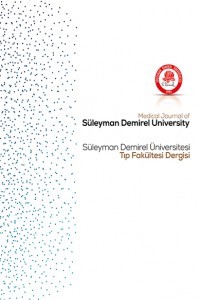Omfalosel ve kranioraþiþiz totalis birlikteliði: Tanýsal özellikleriyle birlikte üç boyutlu ultrasonografinin yeri
Omfalosel; karýn içeriðinin ince bir membran içinde fýtýklaþtýðý karýn ön duvarý defektlerindendir. Yüksek morbidite ve mortalite gösteren omfalosel en sýk görülen karýn ön duvarý defetlerindendir. Ýnsidansý yaklaþýk olarak 5000 canlý doðumda 1'dir. Kranioraþiþiz totalis; spinal defektle devamlýlýk gösteren anensefalidir. Defekt konsepsiyon sonrasý 28 günlük sürede nöral tüpün kapanmamasý ile oluþur ve fetal kayýp, ölü doðum ya da yenidoðan ölümüyle sonuçlanýr. Prenatal tanýsal araç iki anomali için de ultrasonografidir. Çoðu vakada iki-boyutlu konvansiyonal ultrasonografi kesin taný için yeterli görüntüleme saðlar. Bu raporda omfalosel ve kranioraþiþiz totalis birlikteliðini üç-boyutlu ultrasonografik ve post-abortal bulgularýyla sunuyoruz.
Anahtar Kelimeler:
Omfalosel, Anensefali, Prenatal taný, Karýn ön duvarý defektleri, üç boyutlu görüntü
Association of omphalocele and craniorachischisis totalis: The role of three-dimensional ultrasonography with diagnostic features
Omphalocele is an anterior abdominal wall defect with the herniation of the visceral contents covered by athin membrane. It is one of the most common malformations of the anterior abdominal wall, with highmorbidity and mortality. The incidence of omphalocele is nearly 1 in 5,000 live births. Cranirachischisistotalis is anencephaly with a contiguous spinal defect. The defect occurs with the failure of neural tube toclose within 28 days after conception and leads to fetal loss, still birth, or neonatal death. Prenatal diagnostictool for both anomalies is ultrasound. In most cases two-dimensional conventional ultrasound providessufficient images for the accurate diagnosis. In this report, we present the association of omphalocele andcraniorachischisis with the three-dimensional ultrasonographic and post-abortal findings
Keywords:
Omphalocele, Anencephaly, Prenatal diagnosis, Abdominal wall defects, 3D Image,
___
- Stone P. Gastrointestinal Abnormalities. In: High Risk Pregnancy Management Options. Harcourt Brace and Company, London.1999. p. 443-6
- Richmond S, Atkins J: A population-based study of the prenatal diagnosis of congenital malformation over 16 years. BJOG 2005;112: 134957
- Fleischer AC, Manning FA, Jeanty P, Romero R. Sonography in Obstetrics and Gynecology Principles and Practice. Pilu G, Romero R, Gabrielli S et al. Prenatal diagnosis of cerebrospinal anomalies. Prentice- Hall International, London. 1996: 375-392.
- Creasy RK, Resnik R. Maternal Fetal Medicine Principles and Practice. In Basic Genetics and Patterns of Inheritance, Jones OW, Cahill TC (eds). WB Saunders Company: Philadelphia, 1994; 3-60.
- Detrait ER, , Etchevers HC et al. Human neural tube defects: developmental biology, epidemiology, and genetics. Neurotoxicol Teratol. 2005; 27(3):515-24. Epub 2005 Mar 5.
- Moore CA, Harmon JP, Padilla LM, Castro VB, Weaver DD. Neural tube defects and omphalocele in trisomy 18. Clin Genet. 1988; 34(2):98-103.
- Kara M, Yýlmaz E, Okumuþ B, Aran E. Akrani ve omfaloselin eþlik ettiði fetal anomali: Olgu sunumu ve literatürün gözden geçirilmesi (A fetal anomaly with acranian omphalocele: Case report and review of the literature) (Turkish). TJOD Derg 2009; 6(4): 283- 5.
- Fong KW, Toi A, Salem S, Hornberger LK, Chitayat D, Keating SJ, McAuliffe F, JA. Detection of fetal structural abnormalities with US during early pregnancy. Radiographics. 2004; 24(1):157-74.
- Gibin C, Touch S, Broth RE, Berghella V. Abdominal wall defects and congenital heart disease Ultrasound Obstet Gynecol 2003; 21: 334337
- See TC, Set PAK, Brain J, Coleman N. Prenatal sonographic diagnosis and outcome of anterior abdominal wall defects. Ultrasound Obstet Gynecol 2000 ):61
- Bonilla-Musoles F, Machado L, Bailao LA, Osborne N, Raga F. Abdominal wall defects: two- versus three- dimensional ultrasonographic diagnosis. J Ultrasound Med 2001;20(4):379-89
- Pasquier JC, Morelle M, Bagouet S et al. Effects of residential distance to hospitals with neonatal surgery care on prenatal management and outcome of pregnancies with severe fetal malformations Ultrasound Obstet Gynecol 2007; 29: 271275.
- ISSN: 1300-7416
- Yayın Aralığı: Yılda 4 Sayı
- Başlangıç: 2015
- Yayıncı: Süleyman Demirel Üniversitesi
